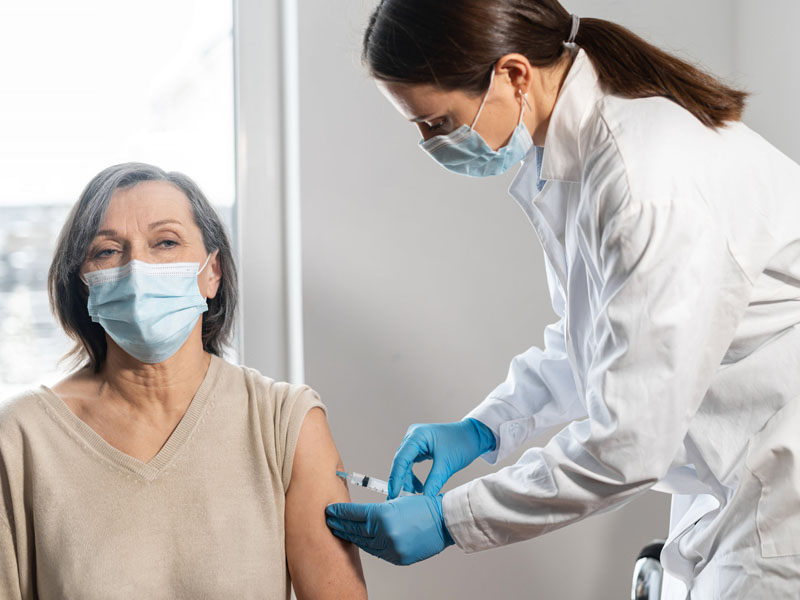COVID-19 Booster Rollout Begins as Vaccination Rate Climbs
AAFP Approves Recommendations for Third Dose
September 30, 2021, 8:40 a.m. News Staff — Regulators last week cleared the way for some patient populations to receive booster doses of the Pfizer-BioNTech COVID-19 vaccine.

The FDA on Sept. 22 amended the vaccine’s emergency use authorization to allow a single booster dose six months after completion of the primary series for individuals
- ages 65 and older,
- 18-64 at high risk of severe COVID-19, or
- 18-64 “whose frequent institutional or occupational exposure to SARS-CoV-2 puts them at high risk of serious complications of COVID-19, including severe COVID-19.”
The CDC’s Advisory Committee on Immunization Practices on Sept. 23 voted to recommend a booster dose in populations at greatest risk for severe complications from COVID-19, including older individuals and younger people with underlying medical conditions. In an uncommon action the following day, CDC Director Rochelle Walensky, M.D., M.P.H., overruled advisers at the agency to add front-line workers — including health care personnel — to the range of patients for whom the panel had recommended third doses of the vaccine.
Walensky, the CDC announced in a Sept. 24 press release, “endorsed the CDC Advisory Committee on Immunization Practices’ recommendation for a booster shot of the Pfizer-BioNTech COVID-19 vaccine in certain populations and also recommended a booster dose for those in high-risk occupational and institutional settings.” The press release pointed to the FDA’s Aug. 23 full approval of the Pfizer-BioNTech vaccine for individuals 16 and older, and its own guidance, as “important steps forward as we work to stay ahead of the virus and keep Americans safe.”
The AAFP approved the recommendations following an expedited review of the evidence. The latest guidance is reflected in the Academy’s updated COVID-19 Booster Doses FAQs page.
Story Highlights
Walensky’s statement said the CDC would “address, with the same sense of urgency, recommendations for the Moderna and J & J [Janssen] vaccines as soon as those data are available.”
The CDC’s approval of Pfizer boosters allowed administration of them to begin right away at facilities already handling the vaccine, including physicians’ offices. Meanwhile, however, the updated guidance has renewed demands on primary care physicians, who deliver the bulk of all U.S. vaccinations, to counsel confused patients.
An executive for an Idaho primary care company named in a Sept. 25 Washington Post story, for example, said that, during the buildup to the booster guidance, it had gone “from 40,000 phone calls daily at 21 clinics to 80,000.”
According to the CDC’s COVID Data Tracker, as of Sept. 28, some 3.4 million people had received an additional dose since Aug. 13 following a recommendation for a third dose in individuals with moderate to severe immunosuppression. More than 185 million Americans are now fully vaccinated.
AAFP Response
“Family physicians are well equipped to continue to answer questions about the COVID-19 vaccines with patients, families and the communities in which they serve,” said AAFP President Ada Stewart, M.D., of Columbia, S.C., in response to the amended EUA.
In a Sept. 22 AAFP virtual town hall, Stewart stressed to Academy members the ongoing need to build immunity to the virus through initial doses.
“It’s really important to let them (patients) know that two doses are still very effective against severe disease, hospitalization and deaths,” she said during the event, titled COVID-19 Vaccine Perspectives: Authorization Updates and Addressing Misinformation. “All of the vaccines are effective against the currently circulating variants. All these vaccines are effective at preventing serious disease and hospitalization.”
Marketed under the name Comirnaty, the Pfizer-BioNTech vaccine received full licensure in August after an EUA that began Dec. 11, 2020, and was expanded on May 10 to include individuals ages 12 to 15. The AAFP has asked the FDA to prioritize the review of data to facilitate an EUA for children younger than 12.
In a Sept. 13 letter, the Academy urged the Biden administration to center its latest vaccination efforts on primary care.
“As we enter the next phase of the COVID-19 vaccination process, which will include new vaccine mandates, recommended boosters for some patients and COVID-19 vaccines for children under 12, additional actions are needed to support primary care practices,” the AAFP said in response to the White House’s Path Out of the Pandemic plan, announced Sept. 9.
More From the Academy
AAFP staff experts continue to update content and resources on aafp.org and familydoctor.org to keep members informed as new information becomes available. The Academy’s COVID-19 and COVID-19 Vaccine webpages compile the latest COVID-19 vaccine data as well as information about FDA and ACIP meetings, educational resources, advocacy and more.